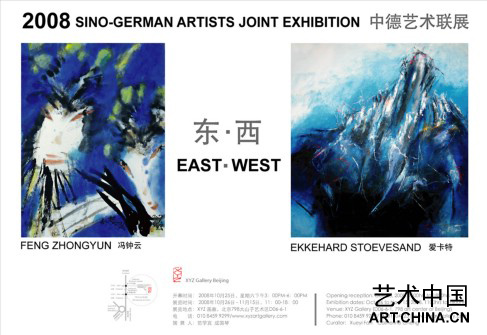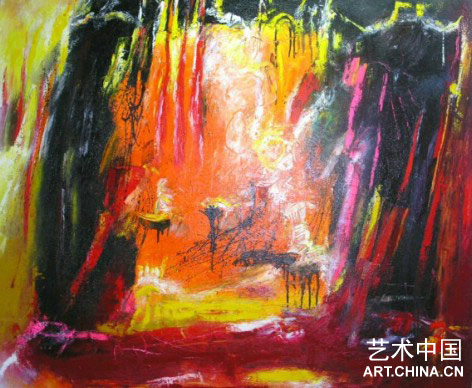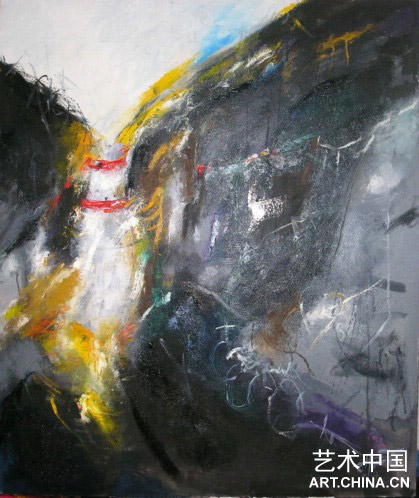
《2008 東?西 中德藝術(shù)家聯(lián)展》愛(ài)卡特、馮鐘云作品展
展覽時(shí)間:2008年10月25日 – 11月15日,11:00AM-18:00PM
展覽地點(diǎn):XYZ畫(huà)廊,北京798藝術(shù)區(qū)798中二街D05
電話(huà):010 8459 9299 / 13701104223
策展人:范學(xué)宜 成國(guó)琴
德國(guó)藝術(shù)家愛(ài)卡特自2002年以來(lái)先后四次來(lái)到中國(guó),他每次都喜歡騎著自行車(chē)漫無(wú)邊際的轉(zhuǎn)悠。長(zhǎng)城、故宮、天津的老街、北京的四合院。。。。。。這里的一切如此這般的刺激著他的神經(jīng)末梢,激活并豐富了他的創(chuàng)作靈感。或許是一抹琉璃瓦的亮光,亦或是一扇廟門(mén)的斑駁,都有可能成為愛(ài)卡特筆下的情調(diào)或風(fēng)景。他往往在畫(huà)布錢(qián)一站就是十多個(gè)小時(shí),對(duì)于愛(ài)卡特而言,“站著”就是最好的活著!就是對(duì)生命最崇高的禮贊。
他的作品構(gòu)圖飽滿(mǎn)、意境深邃、氣韻沉郁而生機(jī)勃發(fā),情脈繁復(fù)而流變有序,在紅與黑的強(qiáng)烈對(duì)比后面,彌漫著一種令人亢奮而又忐忑不安的神秘。不止如此,這種神秘還在無(wú)限的虛化中吞噬、擴(kuò)張,以致生命不堪重負(fù),在優(yōu)雅的輕吟淺唱中慢慢傾斜、、、、、愛(ài)卡特不僅畫(huà)中國(guó)主題的畫(huà),他還要中國(guó)人買(mǎi)得起他的作品。一方面愛(ài)卡特以其抽象的繪畫(huà)語(yǔ)言表達(dá)著他對(duì)中國(guó)人的感動(dòng),另一方面他又以獨(dú)特的方式回報(bào)著感動(dòng)他的中國(guó)人。
中國(guó)當(dāng)代水墨藝術(shù)家馮鐘云九十年代初畢業(yè)于中央美術(shù)學(xué)院中國(guó)畫(huà)系,水墨作品多次在國(guó)際上獲得藝術(shù)獎(jiǎng)。馮鐘云的藝術(shù)實(shí)踐在寫(xiě)實(shí)與抽象兩極之間游走,展示出畫(huà)家駕馭形式的天賦。雖然畫(huà)家對(duì)于傳統(tǒng)與現(xiàn)代藝術(shù)表述形式有著深刻的理解,但是,支持畫(huà)家作品的內(nèi)核卻是它們的內(nèi)容。
從傳統(tǒng)性質(zhì)的作品看,馮鐘云表達(dá)了一種溫厚的審美情趣。接受過(guò)系統(tǒng)學(xué)院教育的作者,不滿(mǎn)足于傳統(tǒng)筆墨趣味的“技術(shù)演練”,而是時(shí)刻將注意力放在形式探索方面。幾何圖案似的構(gòu)成效果,讓我們聯(lián)想到西方現(xiàn)代藝術(shù)的形式。然而,畫(huà)家并沒(méi)有棄絕傳統(tǒng),而是將其融入現(xiàn)代藝術(shù)的構(gòu)成之中。在溫潤(rùn)而厚重之中,不乏熱情與奔放。其中,對(duì)筆墨的解悟,對(duì)媒介材質(zhì)性能的深透把握,是形成馮鐘云藝術(shù)風(fēng)格特征的重要因素。這個(gè)特征使他有別于很多照搬西方現(xiàn)代形式主義繪畫(huà)的當(dāng)代藝術(shù)家的作品。
通過(guò)對(duì)傳統(tǒng)筆墨與西方現(xiàn)代藝術(shù)形式的整合,馮鐘云的抒情溫厚而激越。康定斯基說(shuō)過(guò):“藝術(shù)家必須因感而發(fā),有情可抒,因?yàn)閷?duì)形式的駕馭并非目的,而是使形式與內(nèi)在含義的相適應(yīng)。”可以說(shuō),溫厚的激越,既是馮鐘云作品的形式特征,又是其內(nèi)在的精神特質(zhì)。
 愛(ài)卡特 曾經(jīng)的輝煌 140X100cm
愛(ài)卡特 曾經(jīng)的輝煌 140X100cm
《2008 EAST WEST SINO-GERMAN ARTISTS JOINT EXHIBITION》
EKKEHARD STOEVESAND & FENG ZHONGYUN PAINTING WORKS EXHIBITION
Exhibition dates: Oct. 25, 2008 to Nov. 15, 1100hrs to 1800hrs
Venue: XYZ Gallery, D 05 of 798 Middle Second Street of 798 art center
Curator: Xueyi & Catherine
Contact Information: 010 8459 9299/13701104223
Ekkehard Stoevesand, a German Expressionist Artist, has been to come to China for the fifth times since 2002; loving to wander around town riding his favorite bicycle. Everything he experience in China, like the Great Wall, the Forbidden City, the old street of Tianjing, as well as the traditional courtyards tucked away in the Hutongs, stimulates his nerve and inspires his creativity. Inspiration comes from such beautiful moments as the light reflecting off the old rooftop tiles, or the shadow from a temple door. Capturing such moments on canvas becomes the arduous task, as he might stand in front of the canvas for hour on end before painting, these long hours standing are a small price to pay for the privilege of seizing a rare emotion; for him, the process represents the utmost salute to life.
The structure of his painting is abundant, with in-depth conception, full of profundity and liveliness; the emotion uncovered from his painting is complicated but change is orderly; the contrast of color employed in his works, such as black and red, is both uplifting and depressing, it’s about the uncertainty. Furthermore, the mystery is filled with metaphor, expanding till expression is almost unbearable, then sloping under an elegantly soft melody……
Most of this exhibition’s paintings are about China-motif, additionally the artist want his paintings to be more affordable to Chinese collectors; by doing so, the artist would like to express his affection to the Chinese, expressing his gratitude to the people who inspire him.
Feng Zhongyun, a Chinese Contemporary Ink Wash Painting Artist, graduated from the Chinese Painting Faculty of Beijing’s Central Academy of Fine Arts (CAFA) in early 1990’s, and has won numerous international art awards. Through his artistic experiments, he has been walking between the realistic and the abstract, delivering a unique talent in pushing the form. Although he has a profound understanding of both traditional and contemporary artistic expression, his pursuit of a vision places his style in its own world.
The deep comprehension of brush ink, as well as the proficient grasp of the media, is the most important factor for Feng to form his artistic language. This character differs from most of other Chinese Contemporary artists, who generally imitate Modern Western Art.

愛(ài)卡特 陽(yáng)光下的胡同 110X100cm
|

